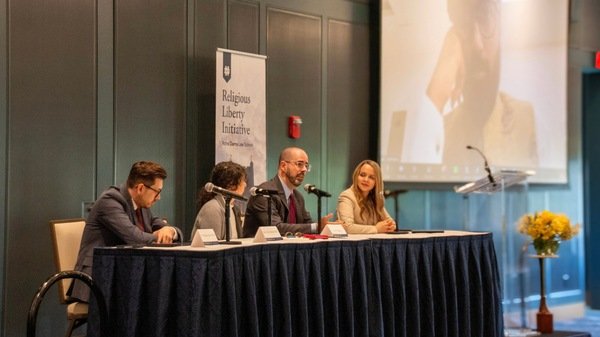Volume 14 Symposium: Religious Speech in the Context of Anti-Blasphemy and Anti-Proselytism Laws
Monday, April 22, 2024
Written by Arienne Calingo
On April 22, the Notre Dame Journal of International & Comparative Law presented the 2024 symposium on "Religious Speech in the Context of Anti-Blasphemy and Anti-Proselytism Laws," co-sponsored by Notre Dame Law School’s Religious Liberty Initiative.
Anti-blasphemy and anti-proselytism laws can stifle the free expression of religion. Enforcing these laws is often a direct violation of Article 18 of the International Covenant on Civil and Political Rights. The symposium sought to analyze these laws and their implications on an international scale to demonstrate how they interact with protecting individuals' rights and freedoms.
Speakers included Dr. Thiago Alves Pinto of the University of Oxford, Arafat Mazhar of Engage Pakistan, Knox Thames of Pepperdine Law School and the United States Institute of Peace, and Rev’d Dr. Helen Hallof Nottingham Law School. Professor Stephanie Barclay moderated the panel discussion.
“The JICL-RLI symposium articulated how religious freedom is directly tied to other rights and freedoms that humans should be afforded. The injustice from infringements of the right to religious expression was demonstrated by showing that while some laws are not facially anti-blasphemous, they can be anti-blasphemous in effect, thereby limiting religious expression for individuals with minority beliefs,” said Sandra Weir, executive symposium chair of the Notre Dame Journal of International & Comparative Law. “It was interesting to hear how action for religious freedom starts at a domestic level before expanding to an international level.”
Alves Pinto served as the keynote speaker at the symposium and called attention to the many parallels between hate speech and anti-blasphemy laws. Under the guise of banning hate speech, some countries use anti-blasphemy laws to punish the free expression of minority viewpoints. The enforcement of these laws poses serious risks to religious minorities, political opponents, and people who have minority viewpoints.
Photo by Arienne Calingo
“Cancel culture is very similar to blasphemy,” said Alves Pinto. “For me, there is no difference between apostasy and blasphemy. They all stem from the same source.”
The speakers also delved into how the definition of hate speech is ambiguous and relies on subjective interpretation, opening the door to arbitrary and harsh accusations and prosecutions. Likewise, key human rights entities have denounced anti-blasphemy laws because they are written in vague and broad terms and are prone to arbitrary enforcement, enabling countries to use the laws to attack religious and political minorities.
“There is a need for protection of minorities,” said Alves Pinto. “Diversity is not a threat.”
Next, Mazhar provided a comprehensive overview of Pakistan’s harsh anti-blasphemy law. The law is meant to protect against insults to Islam, and those accused of violating it are often sentenced to death. Critics argue that Pakistan’s anti-blasphemy law is overly draconian and heavily exploited to target and persecute the country’s religious minorities.
“Anti-blasphemy laws are used as an instrument to divide communities,” Mazhar said. “The fluidity of the way that the punishment is defined goes into the crime. The crime becomes extremely expansive, and the punishment becomes very specific.”
In his efforts to reform Pakistan’s anti-blasphemy law, Mazhar draws upon Islamic legal reasoning in his work in order to interpret the law and present a perspective that diverges from what is commonly known and believed about the laws in Pakistan, namely the view that they are unable to be reformed or challenged. Mazhar believes that the inclusion of an unpardonable death sentence as the only possible punishment for blasphemy in Pakistan is wrong.
Thames offered insights into anti-blasphemy laws from a policy perspective and explained why the United States opposes such laws. He served the Obama and Trump administrations as the Special Advisor for Religious Minorities in the Near East and South/Central Asia at the U.S. State Department.
“Blasphemy laws, and the often related laws of apostasy, are increasingly common tools used by governments to oppress freedom of belief and expression,” he said. “We prefer working together to promote tolerance.”
Thames called for the United States and, specifically, the United Nations to highlight human rights abuses and support communities where persecution often runs rampant.
“The United States must engage,” he said. “The United Nations can serve as a crucial venue to advance values and interests, and also lend crucial aid to those victims who have been prosecuted.”
Thames added, “Pushing for a global blasphemy law presents the appearance of protecting the faith.” He emphasized that anti-blasphemy laws are so focused on protecting religion rather than people. “Ideas don’t have rights,” he said. “People have human rights.”
Rev’d Dr. Helen Hall focused on questions of identity. “Identity is key. There is often a sense of a desire to belong. People want to be seen as belonging to a particular group,” she stated. Like Alves Pinto, Hall asserted that questions related to identity are pertinent to consider when addressing the intricacies of anti-blasphemy laws.
At the end of the symposium, Alves Pinto encouraged the attendees to acknowledge and appreciate the value of engaging with different points of view. “Within your own faith, try to see the diversity,” he said. “Try to see that there are people who push against firmly held beliefs. Even if you disagree, the fact that you were pushed to think about beliefs other than your own is a good thing as a whole.”
[See full article here.]



